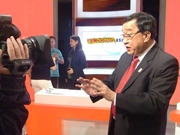News
Asian Migration: More Benefits or Drawbacks?

The live television debate “Bridging Asia”, hosted by Channel News Asia, was aired 16 October 2012. The debate discussed if Asian Migration brings more benefits or drawbacks. Migration for employment is increasing rapidly as the quest for greater business flexibility intensified with competitive pressure. Conventional wisdom holds that migration is generally a good thing as host countries can plug the gaps in their labour markets. But the terms and working conditions of many migrants are exploitative and skilled labour migration causes a “brain drain”, depriving economies of the type of workers needed for sustainable development. Issues such as competition for jobs at the receiving countries and the decrease of salary due to cheap labour imported remain as drawbacks.
Christopher Ng and his teammate Rex Verona, Former Executive Director of Asian Migrant Centre, argued on the basis of migration to support development, and not relying on migration as the solution for development.
Despite starting as the underdog with only 25% of votes, Christopher’s team won over the debate with 57% votes from the audience and home viewers agreeing that Asia migration brings more drawbacks than benefits. Christopher and his team are the first to beat the odd in the series of debates that started in 2011.
The team arguing for more benefits was Andre Bruce, Regional Director for Asia and the Pacific, International Organisation for Migration, and Michael Dee, an American private investor and philanthropist.
Winning over the crowd, Christopher’s team reasoned that Asia migration cannot bring more benefits until Asian countries set policies to develop their economy effectively. Asian countries should not rely on migration as the only way to solve their existing problems.
Asia migration continues to rely on exploiting cheap labour model. Unless migration can be relatively well managed by proactive policies to ensure the rights of low-skilled migrant workers, the drawbacks still outnumber the benefits.
UNI Apro is developing partnership with NGOs to assert for social dimensions to migrant issues. We are working closely with the ASEAN Task Force on Migrant Workers to develop an ASEAN Multilateral framework for national laws and practices governing cross-border movement of workers based on respect for core labour standards and other human rights.
At an international level, UNI Apro is cooperating closely with other GUFs in the campaign for global migration policies. These policies must recognise the positive contributions of migrant workers to host and home countries, as well as place migrant welfare and rights at their centre.
As the global union for the services sector, UNI Apro will continue to play a vital role in providing solutions to the Asia migration so that working people can enjoy the fruits of migration in Asia.
You may catch the recording of the debate at: http://www1.channelnewsasia.com/bridgingasia/migration/

